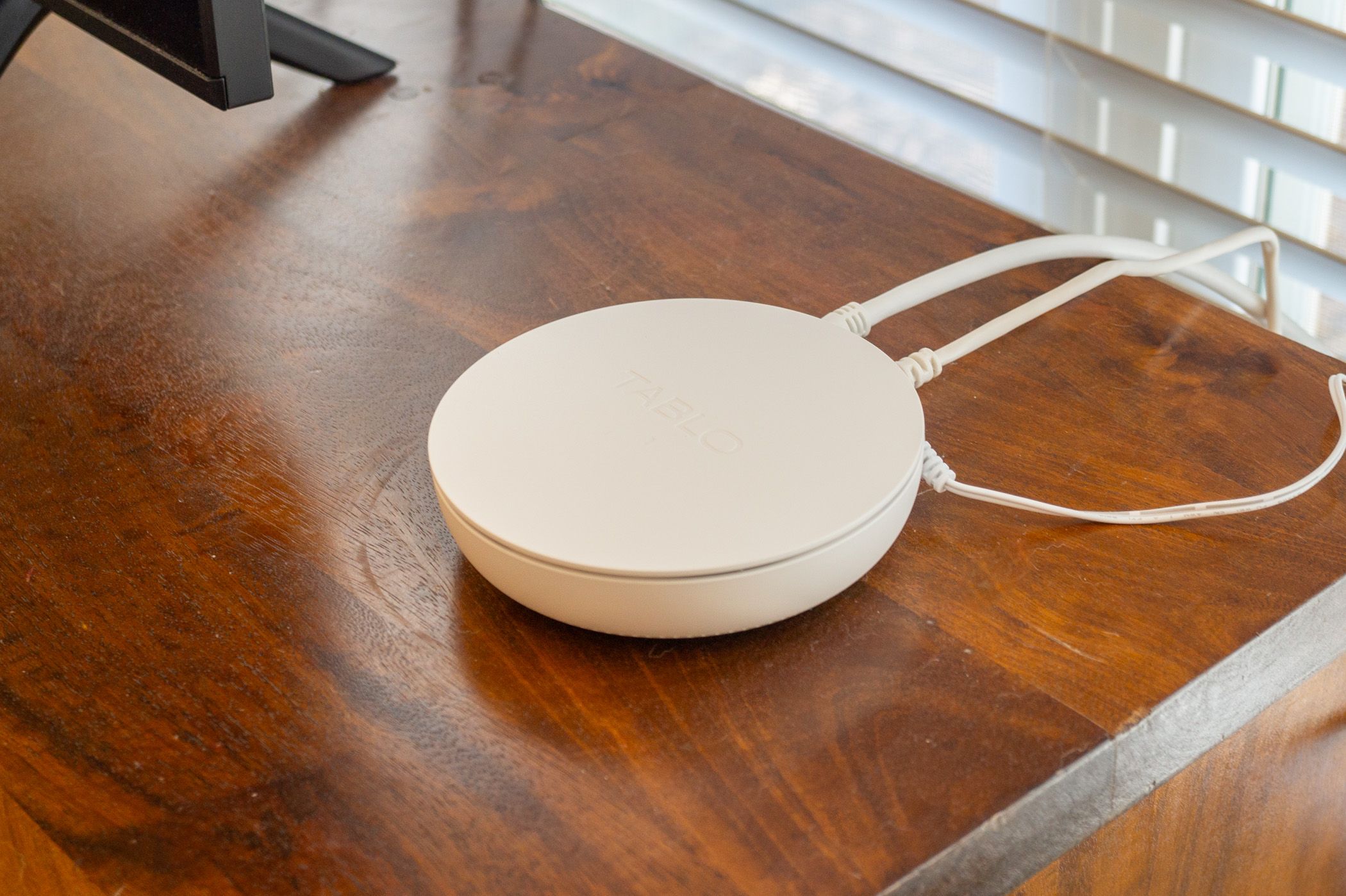
Experience the Next Level of Viewing with Tablo's 4Th Gen DVR - Watch Live Local Channels, Free of Charge

Experience the Next Level of Viewing with Tablo’s 4Th Gen DVR - Watch Live Local Channels, Free of Charge
Key Takeaways
- The Tablo (4th Generation) DVR allows you to watch and record live TV without any recurring subscriptions or fees.
- With its easy setup and support for six streams at once, the Tablo DVR offers convenience and flexibility for large households.
- While the Tablo lacks compatibility with ATSC 3.0 and the ability to stream TV on a computer or from another network, it is still a reliable option for watching over-the-air channels.
Cable TV is always increasing in price, and streaming services are becoming more expensive, but over-the-air (OTA) television in the United States is still free once you have the required equipment. There are many set-top boxes and DVRs that can better assist in watching those free channels, and one of the latest options is the Tablo (4th Generation) DVR .
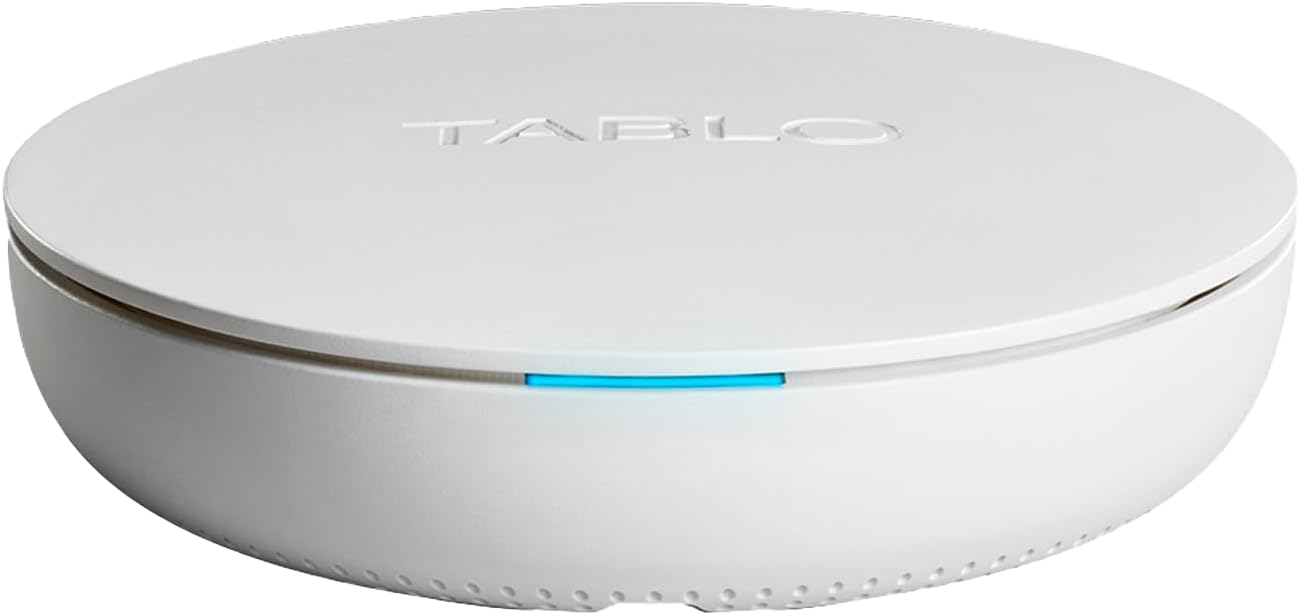

Tablo 4th Gen
8/ 10
Watch and record live TV, subscription-free. Just one Tablo delivers antenna TV and free streaming channels to every screen in your home.
Dimensions
127mm x 127mm x 35mm (5” x 5” x 1.37”)
Data Ports
Ethernet 10/100, USB 2.0, Coax
Wireless connections
802.11ac dual band WiFi with MIMO
Tuners
2x ATSC 1.0
Storage
128GB (50+ hours), USB hard drive support
Pros
- Easy to set up
- Supports six streams at once
- No recurring subscriptions
Cons
- Not compatible with ATSC 3.0 (“NextGen TV”)
- Can’t stream TV on a computer
- Can’t stream TV outside the home
$100 at Amazon See at Tablo $99.99 at Best Buy
Price and Availability
The latest Tablo DVR is available for $129.95 with an antenna included in the box, called the “Tablo Total System.” The antenna is advertised as having a maximum range of 35 miles, but that will depend on the terrain in your area and where the TV towers are physically located. If you already have an antenna or plan to buy a separate one, you can buy the Tablo DVR on its own for $99.95.
You can buy the Tablo DVR from Tablo’s online store , Amazon , Best Buy , and other retailers. Not all stores sell both versions, so be sure to check that you’re not over paying for gear you don’t need.
The Design of a Modern DVR
The 4th Gen Tablo DVR is a white circular box, measuring 5 inches across (127mm) and 1.37 inches tall (35mm). It’s small enough to easily fit wherever it’s needed, whether that’s in a TV cabinet next to an existing antenna setup, next to your router for a wired internet connection, or somewhere else. The only visible features are a Tablo logo on the top and an LED status light. There are four ports on the back: the power input, ethernet (100 Mb/s), USB 2.0, and the coax port for the TV antenna.
The ethernet port will give you the most reliable and responsive connection when streaming TV to other devices, and there’s an ethernet cable included in the box. A direct connection to your router works best, but if you have a mesh Wi-Fi network with ethernet ports on each station, connecting the Tablo to one of those stations will give you a strong connection. There’s also built-in Wi-Fi 5 (802.11ac dual band with MIMO) as a last resort, which should still work fine if your Wi-Fi network has strong reception where the Tablo DVR is located.
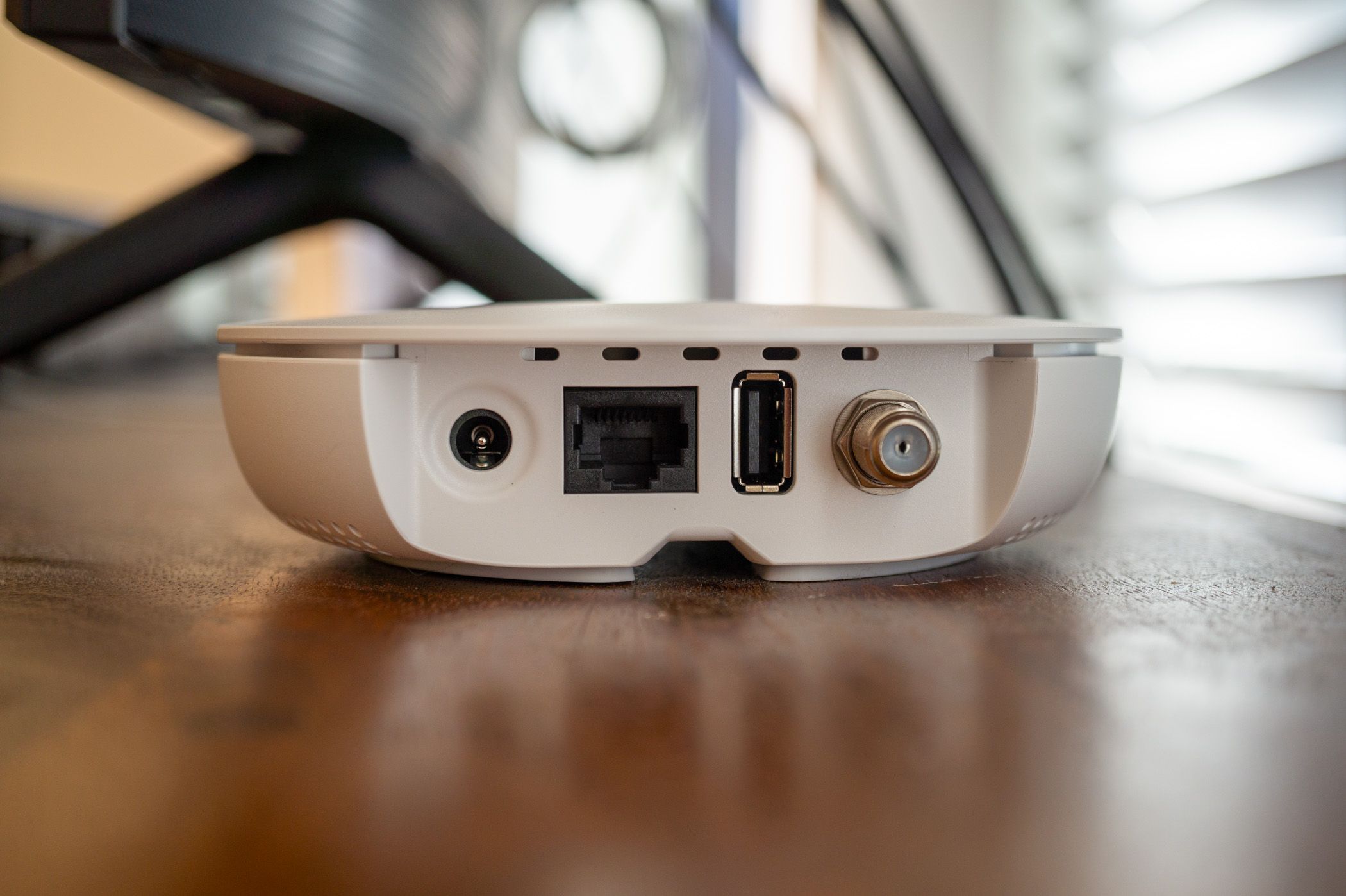
Corbin Davenport / How-To Geek
The USB 2.0 port can be used to add more storage for recordings. Tablo claims you can connect USB hard drives up to 8TB in size, which would give you around 1,000 hours of HD storage. Any external USB hard drive or solid-state drive should work, but not flash drives, since most of them can’t sustain the read and write speeds required for streaming media. The new Tablo DVR has enough built-in flash storage for 50 hours of HD recordings.
The most important connection, and the one that might determine where you can place your Tablo, is for the antenna. The antenna needs to be placed where you can get the best reception and the most channels, which might mean high up on a wall, on a different wall, or in another room facing a different direction. You can use Tablo’s website or FCC.gov to see which networks will probably work in your area with an average TV antenna. If you want even more information, RabbitEars can tell you the exact positioning of each tower, which can help with the antenna positioning. A compass app on your phone can help you figure out the exact direction.
The TV antenna included in the Tablo Total System package is a flat indoor antenna, with a white color on one side and black on the other. That helps it blend in with most wall colors, and a coaxial cable is also in the box for connecting the antenna to the Tablo.
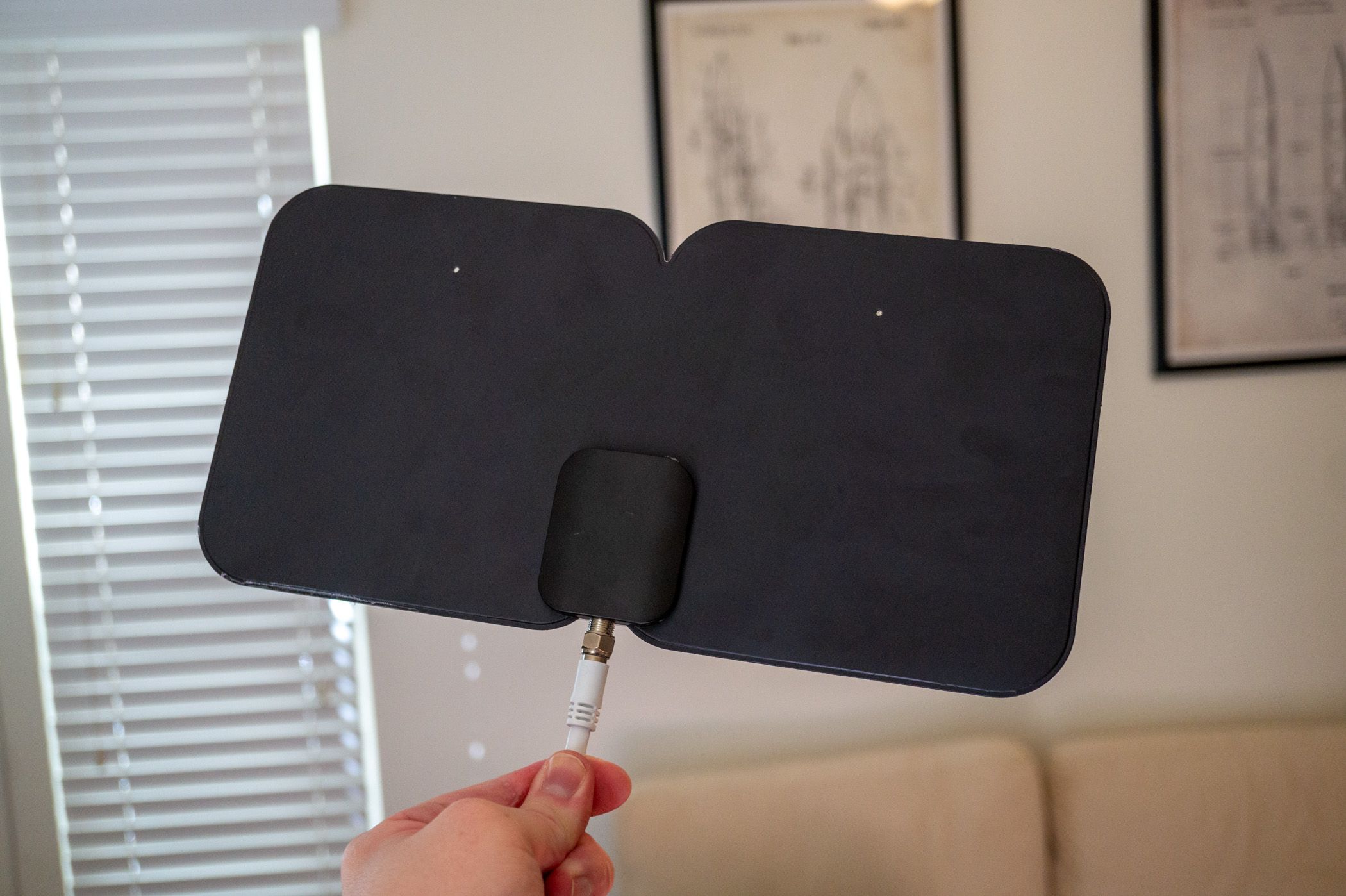
Corbin Davenport / How-To Geek
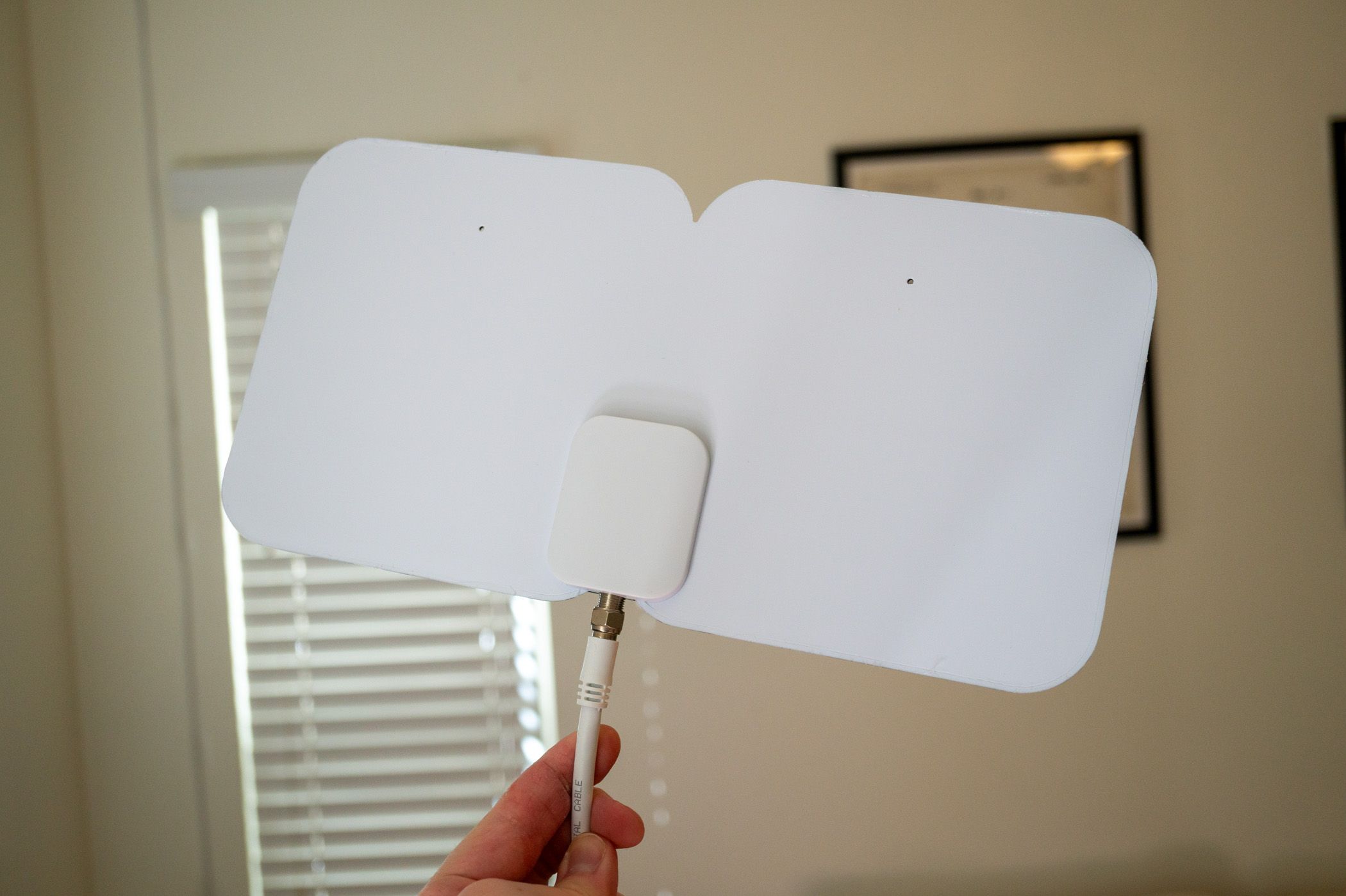
Corbin Davenport / How-To Geek
Close
You might notice something missing from that list of ports: there’s no video output. You can only watch content from the Tablo through the app, which is available on most streaming sticks and some smart TVs. If you don’t have a compatible TV, you’ll need to buy a streaming stick .
Software & Setup
The setup process for the Tablo is fairly quick. Once everything is plugged in, download the Tablo app on your iPhone, Android device, or iPad, and it will walk you through the process of setting up a free account and connecting the Tablo to your network.
The final step is to scan for local networks, which you can do again from the app settings at any point in the future, in case you move or channels in your area change. Tablo also provides a few additional internet-based channels, much like the ones you’d get through Pluto TV and other similar services—the current roster includes Ion Mystery, Laff More, Bloomberg TV+, Scripps News, and HSN. If there are channels you don’t care about (internet or local), you can hide them from the app settings, which will also cancel any scheduled recordings for that channel.
Tablo currently has apps available for Roku, Amazon Fire TV, Android TV/Google TV, iPhone, iPad, and Android devices. The company’s website says apps for Apple TV, Samsung TVs, LG TVs, and Vizio TVs are “coming soon.”
Notably, that list doesn’t include any Xbox or PlayStation consoles, and there’s no desktop or web application at all, so there’s no official way to watch TV from a computer. The Tablo Android app can be installed on a Chromebook through the Google Play Store, but at least on my ASUS Chromebook, maximizing the window forced the app into portrait mode. You might be able to run Tablo on a Windows PC with Bluestacks or WSA , but those are far from ideal solutions.
Close
The Tablo app is organized into three tabs. The “Home” tab highlights content available to watch from your available channels, with dedicated sections for upcoming live sports, network premieres, news, talk shows, and other categories. If the show or movie is live, tapping it will instantly take you to the live stream. If the content is airing later, you’ll see details from the guide and a one-tap button to record it.
The “Live” tab is where you can see all your channels, presented just like every other TV guide interface. You can tap on a channel to start playing it, and tapping a show or movie in the schedule will display any available information and recording options. The guide works best in landscape mode, but the Tablo app doesn’t allow rotation on phones with the guide open. That makes the Live tab much more difficult to read on a phone. Making matters worse, there’s no search feature at all, which seems like basic functionality for any DVR.
Finally, there’s the “Library” tab, which displays all your existing recordings and a list of future scheduled recordings. The bottom of the screen has filters that organize the recordings into TV shows, movies, and sports. That might come in handy, because just like with the Live tab, there’s no search function.
The player interface is pretty simple. There’s a play and pause button in the center, and you can jump forwards and backward using the 15-second buttons or the timeline scrubber. There’s also some basic information at the top, including the channel name and number, age rating, and program title. However, you can’t switch channels from the player (you have to close the stream first), and there’s no option to use a Chromecast or AirPlay device. I also noticed on my iPhone 15 that the app wasn’t properly rotating when switching to the player. The video feed was rotated, but the app remained in portrait mode, leaving the phone’s gesture button on the wrong side. The Android and iPad apps didn’t have the same issue.
Performance and Playback
The Tablo DVR has two built-in tuners, meaning you can watch and record up to two live channels simultaneously, and the Tablo can stream TV to up to six devices simultaneously. For example, two people could be watching different live TV channels while four other people are watching recordings, or six people could watch recordings while the Tablo DVR records shows on two channels. That can be helpful for large households, but not for sharing with friends or family somewhere else—the 4th Gen Tablo DVR can’t be accessed from outside your local network, unlike Plex live TV and previous Tablo models .
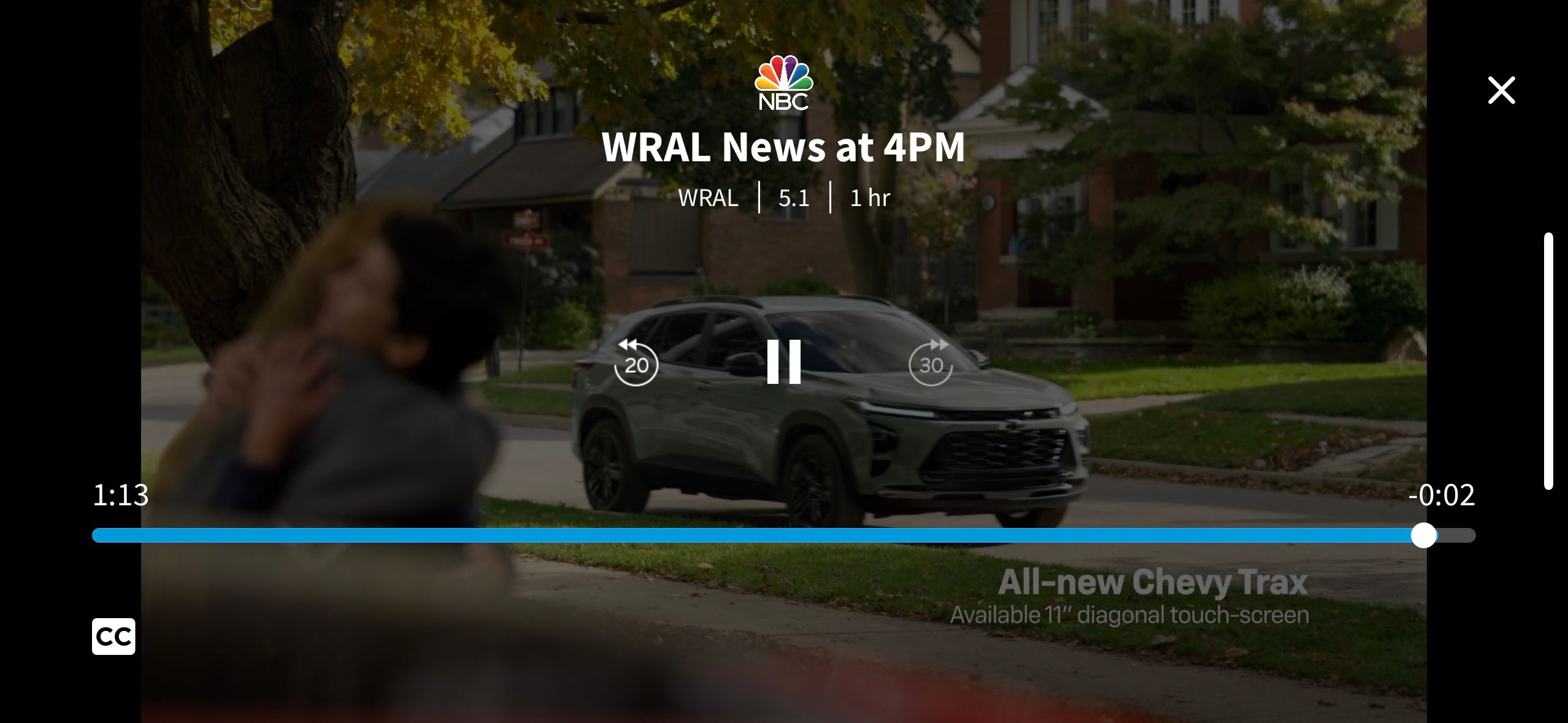
Tablo says in the FAQ section on its website that a 4-tuner Tablo is under development, which would allow more simultaneous recordings and/or more devices streaming live TV at once. If you absolutely need more tuners right now, you could buy another Tablo unit and switch between them as needed in the Tablo app. You would also need another antenna for the other Tablo, or you could share the same antenna across multiple devices with an amplified splitter .
With the Tablo connected to my router with an ethernet cable, I didn’t have any problems watching TV. Live channels opened within a few seconds (as long as the antenna signal was strong), and playback for recordings started instantly. Tablo also passes through 5.1 Surround Sound when available, so audio quality in live TV and recordings should match the original broadcast. The video quality also looked great for me, but the resolution will depend on the given channel. Many broadcast channels in the US are still 720p or 480p/480i.
Unfortunately, the Tablo DVR does not support ATSC 3.0 , just the regular ATSC 1.0 standard that supports up to 1080p (there is no ATSC 2.0). ATSC 3.0, also branded as NextGen TV, is the new standard for over-the-air television that supports 4K playback, interactive content, and other features. The number of channels broadcasting in ATSC 3.0 is growing , but there have been some issues with DRM-breaking DVR features , which might be why Tablo didn’t bother adding it to this model.
Tablo’s lack of ATSC 3.0 support doesn’t mean you lose any channels, though. The FCC has said that channels must continue broadcasting ATSC 1.0 until July 17, 2027, at the earliest, and it’s likely that most channels will continue broadcasts past that point (otherwise they would lose viewers).
Competition
There are a few other popular over-the-air streaming and DVR boxes. The most powerful option is probably the HDHomeRun series from SiliconDust, some of which have up to 4 tuners and support for ATSC 3.0. The low-end HDHomeRun Flex Duo is almost the same price ($110) as the Tablo, with the same two tuners and ATSC 1.0 support, but no integrated storage. You have to plug in a drive or buy one of the higher-end models with internal storage.
The main difference with HDHomeRun is the software. There’s an official app available for Android, iPhone, iPad, and Windows, plus Kodi add-ons and other unofficial methods for streaming on other platforms. You can also pair an HDHomeRun with a Plex server to stream and record TV through Plex. Basically, an HDHomeRun is more versatile, but less user-friendly and potentially more expensive.
Sling TV has also sold some AirTV receivers over the years, which are designed to add local channels to an existing Sling TV package, but you don’t strictly need a Sling subscription. I’ve been using an AirTV 2 , allowing me to watch TV through the Sling app (which is available on more platforms than Tablo ) or through a desktop browser. However, Sling only appears to be selling the AirTV devices in bundle packages with a Sling TV subscription, as of the time of writing. You can find standalone AirTV 2 receivers on eBay and other similar sites, but it doesn’t seem to be as well-supported as Tablo at this point.
Should You Buy the Tablo 4th Gen?
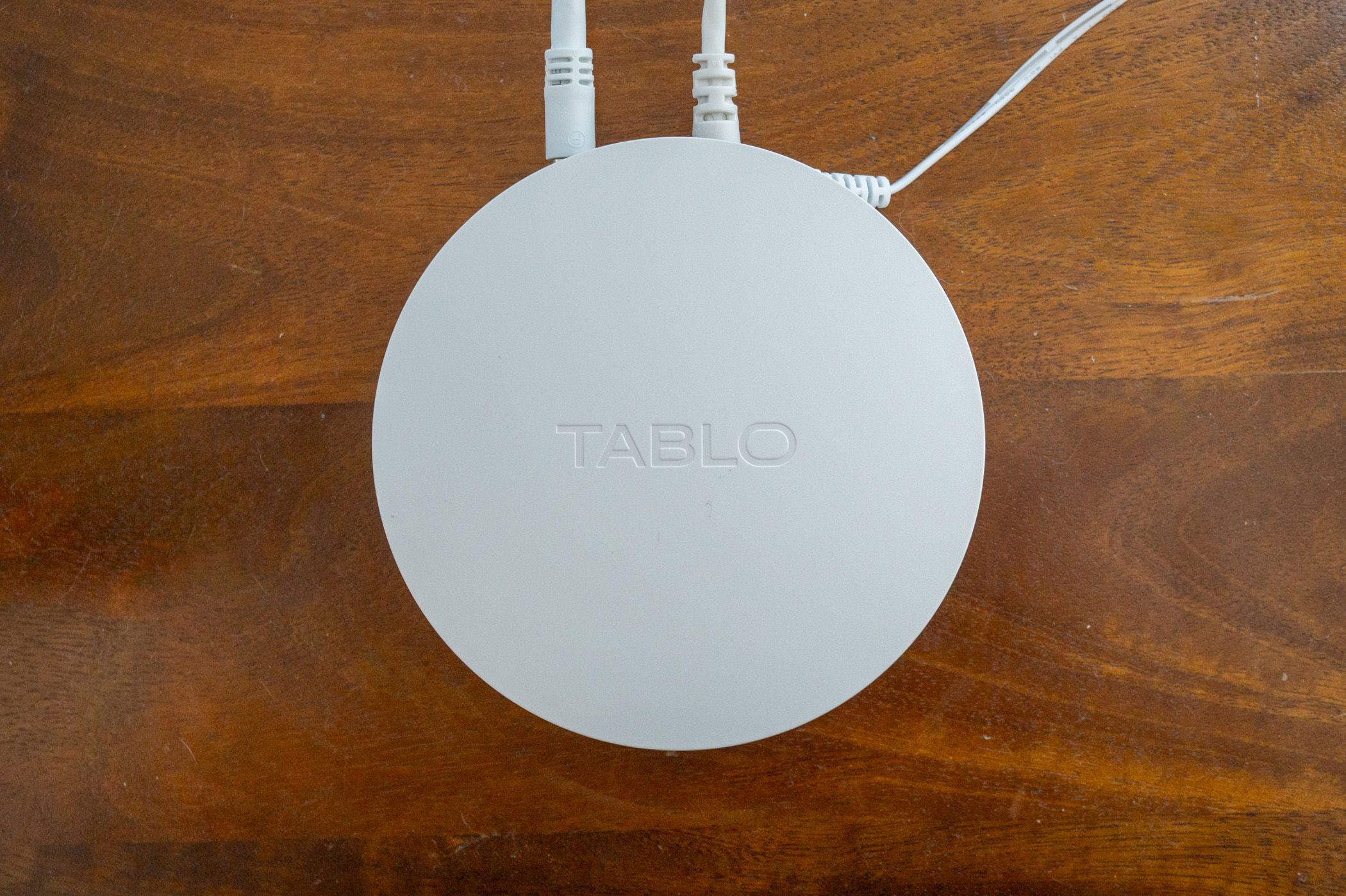
Corbin Davenport / How-To Geek
The Tablo (4th Generation) DVR is an easy and simple way to watch over-the-air TV from anywhere in your home, and it does what it sets out to do. I have some complaints, especially the lack of ATSC 3.0 support and the sometimes-buggy app, but it’s probably still the best option for someone who wants a plug-and-play solution. It brings some of the conveniences of cable TV subscriptions to over-the-air channels, like multi-device streaming and DVR recording, without any recurring costs.
This new Tablo DVR would be much easier to recommend widely if the software was more polished. The mobile app has some design issues and minor bugs, and the lack of a desktop app or web app is a significant omission. Tablo’s older products had a web browser client and other missing features, but they also required a subscription for most functionality, which is no longer the case with the 4th Gen model. Two steps forward, one step back, as they say.
If you’re looking for the easiest possible way to watch your local TV stations on more devices, the 4th Gen Tablo DVR will do the job. Here’s hoping the software gets better in the months and years ahead.


Tablo 4th Gen
8/ 10
Watch and record live TV, subscription-free. Just one Tablo delivers antenna TV and free streaming channels to every screen in your home.
- Title: Experience the Next Level of Viewing with Tablo's 4Th Gen DVR - Watch Live Local Channels, Free of Charge
- Author: Jeffrey
- Created at : 2024-08-30 09:00:50
- Updated at : 2024-08-31 09:00:50
- Link: https://some-knowledge.techidaily.com/experience-the-next-level-of-viewing-with-tablos-4th-gen-dvr-watch-live-local-channels-free-of-charge/
- License: This work is licensed under CC BY-NC-SA 4.0.

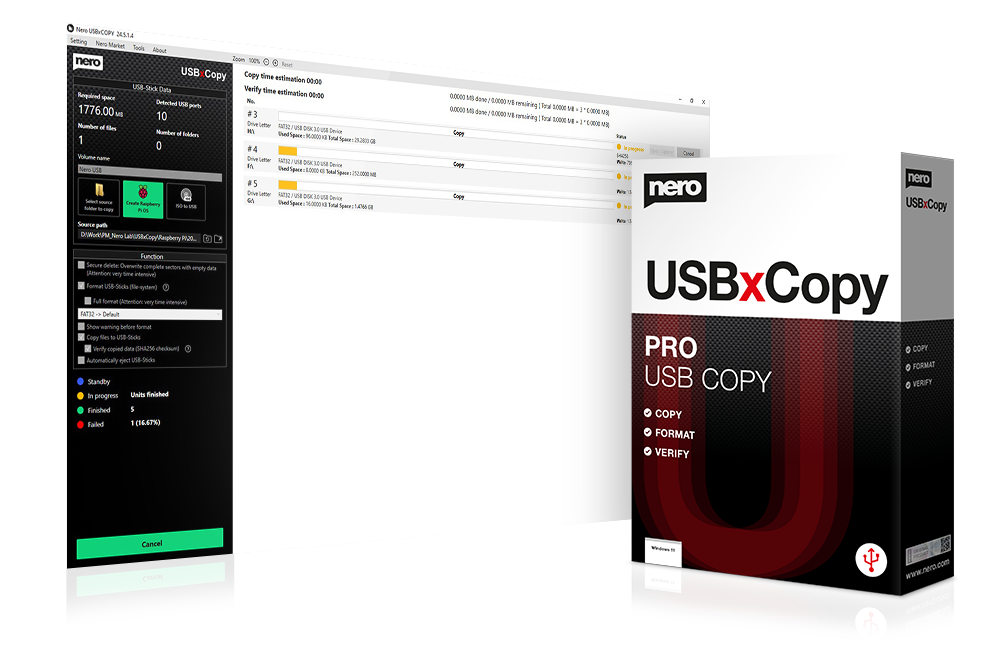

 DLNow Video Downloader
DLNow Video Downloader The BootIt Collection covers multi-booting, partitioning, and disk imaging on traditional PC’s using the standard BIOS and newer PC’s using UEFI. The collection includes BootIt Bare Metal (BIBM) for standard BIOS systems and BootIt UEFI (BIU) for UEFI system.
The BootIt Collection covers multi-booting, partitioning, and disk imaging on traditional PC’s using the standard BIOS and newer PC’s using UEFI. The collection includes BootIt Bare Metal (BIBM) for standard BIOS systems and BootIt UEFI (BIU) for UEFI system.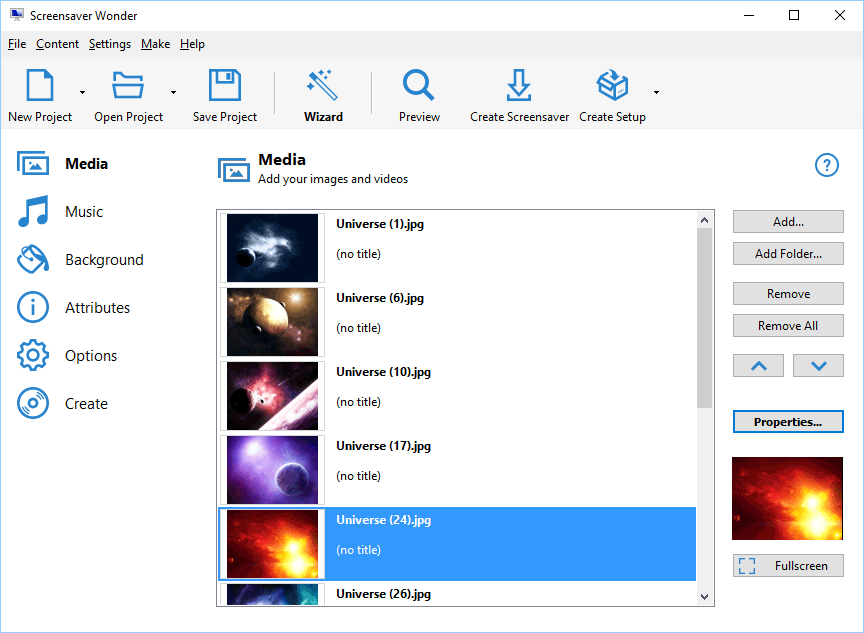 With Screensaver Wonder you can easily make a screensaver from your own pictures and video files. Create screensavers for your own computer or create standalone, self-installing screensavers for easy sharing with your friends. Together with its sister product Screensaver Factory, Screensaver Wonder is one of the most popular screensaver software products in the world, helping thousands of users decorate their computer screens quickly and easily.
With Screensaver Wonder you can easily make a screensaver from your own pictures and video files. Create screensavers for your own computer or create standalone, self-installing screensavers for easy sharing with your friends. Together with its sister product Screensaver Factory, Screensaver Wonder is one of the most popular screensaver software products in the world, helping thousands of users decorate their computer screens quickly and easily.